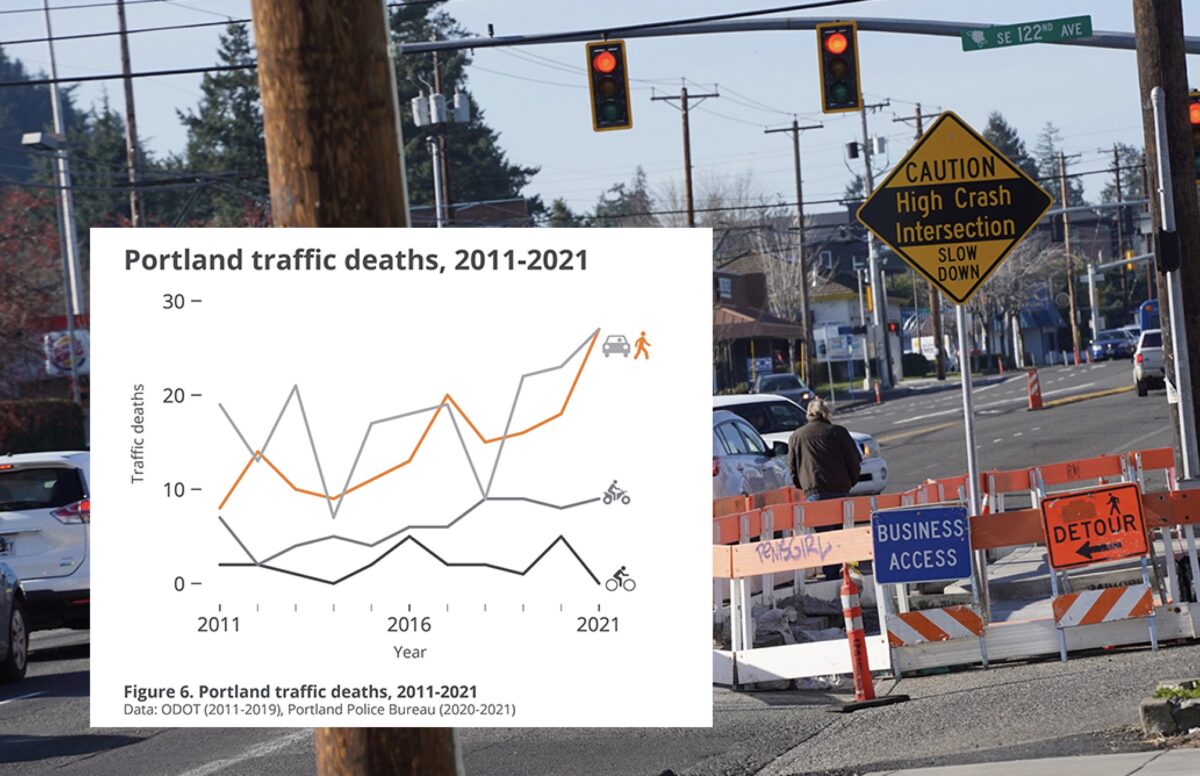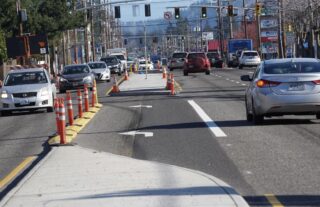Cycling News & Blog Articles
‘Devastating statistics’ outlined in city’s 2021 traffic crash report
“There is no simple or singular solution.”
— City of Portland
The Portland Bureau of Transportation has released their annual Traffic Crash Report and the results are alarming but not surprising to anyone paying attention. The report paints such a troubling picture, even Portland Mayor Ted Wheeler noticed it yesterday. “These statistics are devastating,” he tweeted. “Portlanders deserve safer streets, roads, and freeways.”
He’s absolutely right. He’s also in a position to do much more about it.
According to PBOT’s report, 63 people died on Portland roads in 2021: that’s the highest number since 1990.
“This is a new and unexpected circumstance requiring our focus and attention,” the report states.
Last year, PBOT said the 54 traffic deaths that occurred in 2020 was “unusual and tragic.” But despite PBOT’s framing, historical stats show a clear trend upward.
We’ve been tracking the numbers all year (see our Fatality Tracker for the comprehensive list), and it has been apparent that although Portland’s goal under the Vision Zero program is to eliminate traffic deaths by 2025, we’re headed in the opposite direction.
19 of the 27 people killed while walking were homeless. That’s 70% of the pedestrian fatalities and about one-third of the total.
The report says 60% of the deadly crashes occurred on the 8% of Portland streets that comprise the “High Crash Network,” a list of 30 most deadly streets and intersections. Many of these streets are in low-income communities and communities of color, like in east Portland. And just over half of all traffic deaths recorded by PBOT in 2021 happened on highways and interstates owned and controlled by the Oregon Department of Transportation, a significant jump from previous years.
A particularly alarming statistic in the 2021 report is how many of the people hit and killed while walking were people experiencing homelessness. 19 of the 27 people killed while walking were homeless. That’s 70% of the pedestrian fatalities and about one-third of the total.
PBOT has not tracked housing status before, so we can’t compare this year’s numbers with past statistics. But in the report and a Twitter thread outlining its details, PBOT says that it will take steps to address this alarming disparity by expanding its partnership with the Multnomah County Public Health Department, Portland’s Urban Camp Reduction Program and others to “explore collaborative approaches to increasing safety for Portland’s most vulnerable community members.”
Advertisement
“Complex social factors connected to lack of shelter, medical care and social services are contributing to the recent spike in traffic deaths,” PBOT stated Wednesday.
It should be noted that homeless camp sweeps ordered by Portland’s Urban Camp Reduction Program haven’t proven to successfully help homeless Portlanders find permanent shelter in the past, and instead can be even more harmful. Moving people around without a plan of action may put people further in harm’s way, especially if they’re forced to stay in neighborhoods with street designs they’re unfamiliar with.
Other findings in the PBOT report include that deaths from hit-and-run crashes more than doubled, with 14 people killed in 2021, compared to an average of 6.3. 13 out of 14 of those deaths were people walking.
Pedestrians made up 43% of 2021 traffic fatalities, which is a jump from 38% last year. The annual number of people killed while walking from 2017-2020 was 17, but in 2021, that number jumped to 27. Thankfully, nobody died while bicycling in Portland in 2021.
[Opinion: We’ll never have safe streets if we continue to make safe choices]
The report says that “speed and impairment continue to be dangerous contributing factors in deadly crashes in Portland” and cites World Health Organization data that when average speeds increase 1%, the risk of fatal crashes goes up by 4% and the risk of serious crashes rises by 3%.
It acknowledges that many Portland streets have speed limits at or above WHO-recommended urban speed limit of 30 miles per hour and says that 78% of people died in crashes on streets with speed limits higher than 30 miles per hour.
Recent data from Portland State University’s Transportation Research and Education Center found that posting 20 mph signs in residential areas didn’t do much to make car and truck drivers slow down, but as we reported in 2020 there was a significant reduction in top-end speeding. PSU researchers say more drastic measures, like changing street design, should also be implemented to make a stronger impact on speeding.
PBOT’s addition of concrete barricades on residential streets is a step in that direction.
Portland wasn’t alone in its dramatic rise in traffic fatalities: this was a state and national trend. From data currently available we can see that traffic deaths increased 18.4% nationally during the first half of 2021 compared to the first half of 2020. Statewide, there has been a 15% increase in traffic fatalities from 2020 with almost 600 people dying in traffic crashes.
Despite this alarming uptick, PBOT says it is encouraged by recent announcements of the United States Department of Transportation committing to addressing traffic violence on a federal level after Transportation Secretary Pete Buttigieg called traffic injuries and fatalities a “national crisis.”
Our local crisis is not new. It’s just become so severe it’s finally working its way into the broader public and political consciousness.
Read the full 2021 Traffic Crash Report here.
Taylor has been a BikePortland’s staff writer since November 2021. She has also written for Street Roots and Eugene Weekly. Contact her at This email address is being protected from spambots. You need JavaScript enabled to view it.



